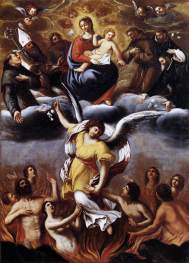Purgatory is a reality but because we cannot see the souls being purified there we tend to forget them. In this meditation we pray about the importance of having great devotion to the holy souls. Using texts of Scripture, the Catechism, Pope Benedict XVI, St Thomas More, St Josemaria, St Augustine and others, we consider that:
- It is difficult to go straight to heaven when we die because the soul must be perfectly purified
- The souls in purgatory suffer greatly from the pain of fire and from not being able to be with the God they love so much
- At the same time they are exceedingly happy
- From the earliest days, the Church has prayed for those who have died
- Our devotion to the souls in Purgatory helps them and makes it easier for us to avoid going there ourselves







